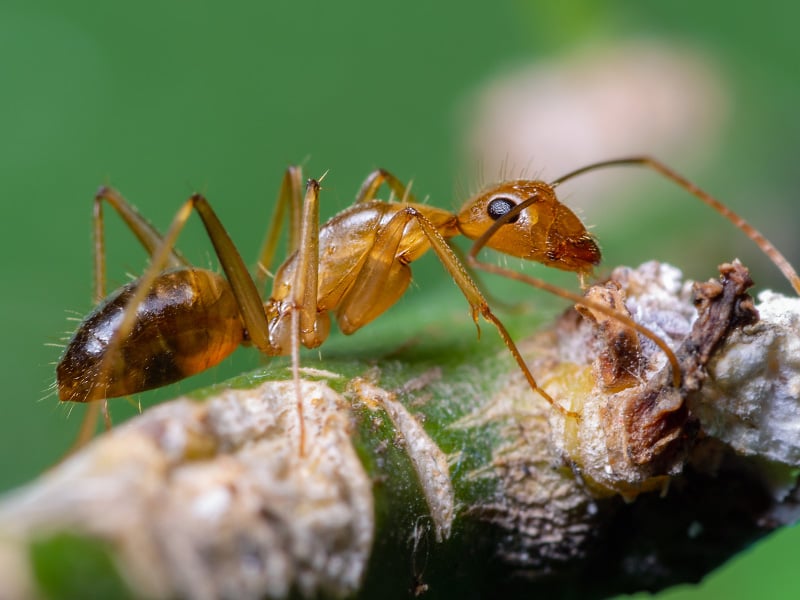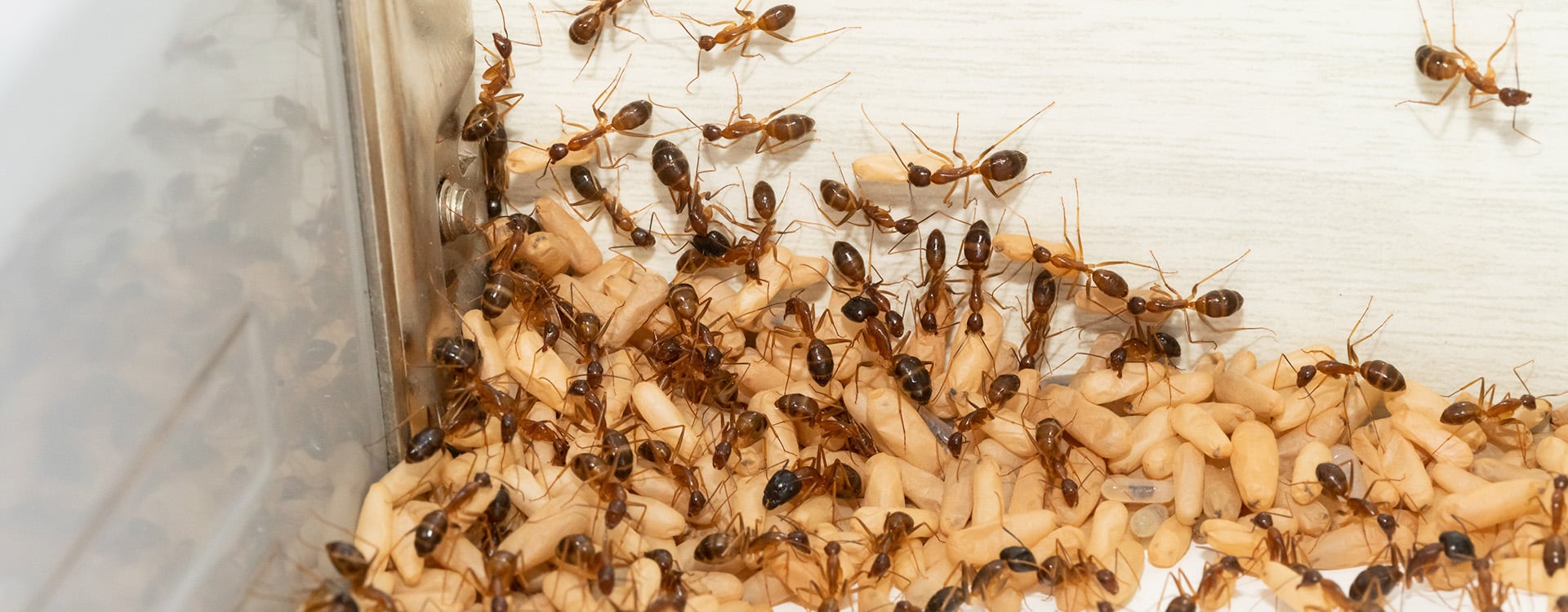What do crazy ants look like?
Crazy ants are tiny, usually no bigger than 1/16 to 1/8 of an inch. They’re slim-bodied, reddish-brown to black in color, and often look like they’ve got a faint gray sheen. If you look closely, you’ll notice they’re covered in fine hairs. At first glance, they resemble several other ant species, which is why behavior is often the easiest way to tell them apart.
What really sets them apart is their movement. Unlike most ants, which follow organized trails back and forth between their foraging area and the nest, crazy ants scatter in frantic, erratic patterns. Their jerky, unpredictable movements make them look disorganized, hence the name “crazy.”

When are crazy ants most active?
Differences between crazy ants and other ant species
- Trail behavior: Most other ant species (e.g., pavement ants, odorous house ants) leave tidy pheromone trails. Crazy ants are disorganized and scatter.
- Nesting pattern: Many species have a single or primary nest with small satellite nests. Crazy ants often have many equivalent nests across a yard.
- Damage: Fire ants sting, carpenter ants damage wood, and crazy ants are more likely to damage electronics by swarming into equipment.
How crazy ant colonies work
Unlike many other ant species that maintain one central nest, crazy ants commonly exhibit polydomy, the practice of maintaining multiple nests tied to a single colony. Each nest can have its own nest entrance, and workers shuttle between these sites and shared foraging areas. That makes control harder: exterminating workers at one nest rarely eliminates the whole ant colony because other nests keep feeding and recruiting. Understanding this network is crucial for effective control.
What attracts crazy ants?
Like many other ant species, crazy ants are opportunistic feeders. They’re drawn to properties that provide them with steady food sources and areas to establish or expand their ant colonies. Outdoors, they feed on seeds, fruits, honeydew produced by aphids, and both live and dead insects.
Common attractants include:
- Fallen trees and rotting logs
- Gardens and compost piles
- Trash cans and recycling bins
- Outdoor eating areas with crumbs or spills
Because they are constantly foraging, a single scout ant can quickly lead an entire colony to your property. Once they find a reliable food source, they’ll expand their trails from the nest entrance to the surrounding area, making it challenging to keep them contained.
Signs of a crazy ant infestation
- Erratic, scattered workers instead of long single-file lines
- Multiple small nest entrances in mulch, soil, or near foundations
- Trails leading from a foraging area (like a grill or fruit tree) back toward the home
- Ants inside food packages, pet bowls, or near light switches and electrical boxes
- Swarms inside electrical equipment or evidence of ants in vents
- Sudden spikes in ant activity after someone leaves pet food, trash, or food debris out overnight
Where will I find crazy ants?
Crazy ants cannot survive in cold weather outdoors, which is why they are widespread in southern states such as Florida.
Crazy ants build nests outdoors under mulch, rocks, leaf litter, or inside tree cavities. In warm regions, they thrive outside, but when the weather cools or becomes rainy, they may move indoors for warmth and shelter.
Inside homes, they’re skilled at hiding in hard-to-reach nesting sites like:
- Wall voids
- Crawlspaces
- Behind baseboards
- Under flooring
Unlike some other ant species that form centralized colonies, crazy ants often split into multiple nesting sites, making elimination challenging. Their colonies can grow massive, covering large areas inside and outside a structure.
Are crazy ants dangerous?
Crazy ants are not a direct health threat, but their sheer numbers can overwhelm property owners. That’s because a single colony can grow into the millions, spreading throughout a yard and home.
In addition to contaminating food, crazy ants are notorious for damaging electrical equipment by swarming inside outlets, HVAC systems, and wiring. Left unchecked, this behavior can lead to costly repairs.
How do I get rid of crazy ants?
Because crazy ants live in sprawling ant colonies with multiple nest entrances, DIY treatments rarely work for long. Spraying a few ants you see won’t reach the colony itself, and over-the-counter baits often aren’t typically effective against this species.
Lindsey Pest Services uses an Integrated Pest Management (IPM) approach to control crazy ants:
- Inspecting your property to identify the species correctly
- Mapping out active trails, foraging areas, and nesting sites
- Treating both the visible ants and the colony source
We recommend signing up for one of our year-round home pest control plans for lasting results. Our services target existing infestations and help prevent new ant colonies from moving in.
How can I prevent a crazy ant infestation?
Crazy ants are persistent pests, and because they live in such large numbers, preventing them requires consistency. Along with professional pest control, homeowners can reduce the risk of infestation with these steps:
- Inspect the exterior of your home for cracks or gaps and seal them
- Pay special attention to spaces around utilities and pipes where ants often find nest entrances
- Cover vents with fine mesh screens
- Trim shrubs and trees so branches don’t touch your home
- Keep lids tight on trash cans and compost bins
- Clean up food debris in outdoor eating spaces
- Remove yard debris like logs, stumps, and piles of leaves
- Keep your kitchen clean, store food in sealed containers, and take out the garbage regularly
By removing easy food sources and blocking common nest entrances, you’ll make your property much less appealing to crazy ants and other pest species. For complete control and prevention, contact Lindsey Pest Services. Proudly serving Greater Jacksonville and the First Coast since 1957; property owners can rely on our local knowledge and extensive experience!
Get Your Free Pest Control Quote Today!
Complete the form below to get started with your free, no-obligation quote, and a Lindsey Pest representative will contact you shortly.
Same Day Service Available!









